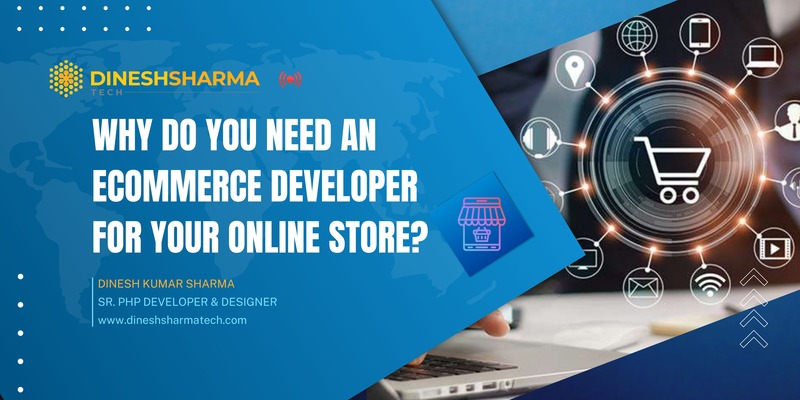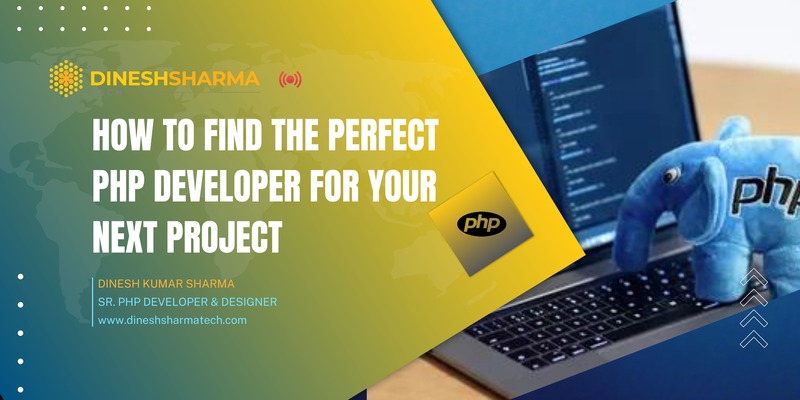Are you looking to bring your products online? And do you want to ensure that the online store is a sales success? If so, then you need an ecommerce developer!
In today’s digital world, having an impressive online presence is crucial for success. However, building and maintaining an ecommerce website can be overwhelming without professional help. That’s where hiring a skilled freelancer comes in handy. In this blog post, we’ll explore why you need a ecommerce developer for your online business and how they can make all the difference in achieving your goals. So buckle up and get ready to learn more about taking your ecommerce game to new heights!
What is an ecommerce developer?
An online store’s design, development, and upkeep are the duties of an ecommerce developer. They use a range of technologies to give customers an effective and convenient shopping experience.
An online store’s design, development, and upkeep are the duties of an ecommerce developer. They use a range of technologies to give customers an effective and convenient shopping experience.
What does an ecommerce developer do?
In order to run a successful online business, you need an ecommerce developer who can help you with the many facets of running an online store. You can get help from a good e-commerce developer with things like designing your website, adding payment gateway options, and setting up your shopping cart software.
They will also be able to give you suggestions on how to successfully market your company online. A good ecommerce developer will also be able to offer you technical support as needed and even assist you in troubleshooting potential problems.
Here are some of the typical tasks that an ecommerce developer might perform:
Store Development Tasks:
Setting up the ecommerce platform: The developer is responsible for installing and configuring the ecommerce platform that will be used to build the online store.
Designing the user interface: The developer is responsible for creating the user interface for the online store, including the layout, colours, fonts, and other design elements.
Developing and integrating custom features: The developer may need to create custom features for the online store, such as a shopping cart, payment gateway integration, or inventory management system.
Creating product pages: The developer is responsible for creating product pages that showcase the products or services being sold, including product descriptions, images, and pricing information.
Implementing security features: The developer must ensure that the online store is secure and that sensitive customer data is protected.
Optimising the website for search engines: The developer is responsible for optimising the website for search engines to ensure that the store is easily found by potential customers.
Integrating third-party services: The developer may need to integrate third-party services, such as social media, email marketing, or analytics platforms, to enhance the functionality of the online store.
Troubleshooting Tasks:
Fixing website bugs: The developer is responsible for identifying and fixing bugs that affect the performance of the online store.
Resolving server issues: The developer must troubleshoot and resolve server issues that may cause the online store to go down or experience slow loading times.
Debugging code: The developer must debug the code used to build the online store to ensure that it is working as expected.
Responding to user issues: The developer may need to respond to user issues, such as login or checkout problems, and resolve them in a timely manner.
Updating software: The developer must keep the ecommerce platform and any third-party software used by the online store up-to-date to ensure that they are secure and functional.
How an Ecommerce Developer can help you with online store marketing
A good ecommerce developer will also be able to help you with tasks like search engine optimisation (SEO) and social media marketing. In other words, an ecommerce developer can help you with all aspects of setting up and marketing an online business.
An ecommerce developer can help you with online store marketing in several ways, including:
Implementing SEO best practises: An ecommerce developer can optimise your online store for search engines, which can improve your website’s ranking in search results and attract more organic traffic to your site.
Setting up and managing advertising campaigns: To direct targeted traffic to your online store, an ecommerce developer can assist you in setting up and managing advertising campaigns on various platforms, such as Google, Facebook, and Instagram.
Integrating social media: An ecommerce developer can integrate social media platforms, such as Instagram, Facebook, and Twitter, into your online store, making it easier for customers to share and promote your products.
Creating and managing email campaigns: An ecommerce developer can help you create and manage email campaigns, which can be an effective way to promote your products to your existing customer base.
Implementing analytics and reporting: An ecommerce developer can set up analytics and reporting tools, such as Google Analytics, to help you track website traffic, user behaviour, and other metrics that can help you optimise your marketing strategies.
Creating content marketing strategies: An ecommerce developer can help you create content marketing strategies, such as blog posts, videos, and infographics, to attract more visitors to your online store and keep them engaged with your brand.
By leveraging the expertise of an ecommerce developer, you can improve your online store’s visibility, attract more visitors, and ultimately increase sales and revenue.
What are the benefits of hiring a freelance ecommerce developer?
There are many reasons why you might need to hire a freelance ecommerce developer for your online business. Perhaps you’re starting an online business and need someone to help with the development of your website. Or maybe you already have an online business, but it’s not performing as well as you’d like, and you think that hiring an ecommerce developer in India could help improve your site’s functionality.
Whatever the reason, there are several benefits to hiring a freelance ecommerce developer:
1. You’ll get expert help with developing your website.
A good ecommerce developer will have a wealth of experience building successful online stores. They’ll be able to provide advice and guidance on everything from choosing the right platform to setting up payment methods and shipping options. Additionally, if you’re unsure of exactly what you require, they can assist in evaluating your needs and developing a solution.
2. It’ll save you time.
Developing a website can be a time-consuming process, especially if you’re not familiar with web technologies. By hiring a freelancer, you can free up your time so that you can focus on other aspects of running your business.
3. It’ll save you money.
It can be expensive to hire an in-house web developer, especially if you require someone with specialised knowledge or skills. It can be more economical because a freelancer typically charges less per hour than an employer on a full-time basis or an agency.
How do you find the right ecommerce developer for your business?
There are a few things to consider when looking for an ecommerce developer for your business. First, you need to decide what size company you want to work with. Do you want a large company with a team of developers or a smaller company with just a few employees? There are pros and cons to both.
Second, you need to decide what kind of development experience you need. If you’re just starting out, you may not need someone with years of experience. However, if you have specific requirements, you’ll need to find someone who has the skills and experience to meet those needs.
Third, you need to consider your budget. Ecommerce development can be expensive, so you need to make sure you have the funds available to pay for it. Once you know how much money you have to work with, you can start searching for developers that fit within your budget.
Finally, take some time to read reviews and check out portfolios before hiring anyone. This will give you an idea of the quality of work they can provide. Once you’ve found a few developers that meet your criteria, reach out and get started on developing your online store!
Conclusion
It is clear that hiring a freelance ecommerce developer to help with your online business can be immensely beneficial. With the right person on board, you can save time and money while expanding your reach across multiple platforms.
Additionally, this type of professional expertise will ensure that your website runs smoothly and securely from the backend all the way up to the front end. If you have been considering outsourcing some of your development needs for an ecommerce project, now is definitely the time!




